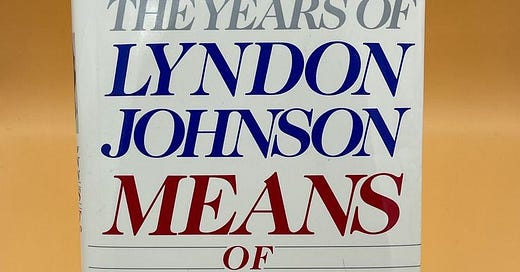Means Of Ascent by Robert Caro
Lying in the little circle of flickering light cast by the fire was a single person: a slender teenage boy. He would be lying beside the fire on his stomach, reading a book.
“IN ALL THE VAST and empty Hill Country, there was no more deserted area than the seventy miles of rolling hills and towering limestone cliffs between Brady and Junction, about eighty miles west of Johnson City. Only a few widely scattered ranch houses dotted that area; for long stretches, after night fell, not a single light marked a human presence. Beginning in the year 1904, however, there was one light. It was the light of a campfire. Each night it was in a different location, for it marked the camp of a wagon traveling each week back and forth between Brady and Junction. Lying in the little circle of flickering light cast by the fire was a single person: a slender teenage boy. He would be lying beside the fire on his stomach, reading a book.
The boy was the son of impoverished parents. He was determined to be something more, and his determination had led him to haul freight between Junction and Brady. Older men, deterred by the loneliness of five nights alone each week in the trackless hills and by the seven dangerous, often impassable, streams that would have to be forded on each trip, had refused even to try to do that. But the boy had tried, and had succeeded. The little freight line was beginning to pay. Yet he was determined to be something more. He wanted a profession, and had written away to a correspondence school for textbooks on bookkeeping. And at night, he would be studying them, in the little circle of light from his campfire.
The boy was Coke Robert Stevenson. And if that scene—the single circle of light in the dark and empty hills; the boy within that circle, studying to get ahead; the courage and ambition which had brought the boy out into the emptiness—symbolizes the legend of the West, so, indeed, Coke Stevenson’s whole life was the raw material out of which that legend is made.” Means of Ascent, Robert Caro
This is how Robert Caro introduces Coke Stevenson. This is not a book about Coke Stevenson. It is the second volume of the Lyndon Johnson biography- Means of Ascent. In Means of Ascent, Robert Caro diagnoses Lyndon Johnson’s life as a congressman and his campaign for his second senate contest. This contest was against one of the most popular politicians in Texas history. A great thing Robert Caro does is to place the lives of Coke Stevenson and Lyndon Johnson side by side. The contrast couldn’t have been more clear. Coke Stevenson was one of the most honest politicians of his day. His outlook on life and politics was deeper. He enjoyed reading books. This was the exact opposite of Lyndon Johnson. Lyndon Johnson was widely known for his lies. No one knew where Lyndon stood. Conservatives thought he was one of them, and Liberals thought he was one of them. He hated reading books so much that his mother had to find creative ways to make him read.
These two met in a contest. In a just world, Coke Stevenson should win. And indeed, he won. But this is a world without justice. Lyndon Johnson stole that election. The great contribution of Robert Caro’s work is that, for the first time, an author dug deep to understand how this election was truly stolen. It was stolen in the most ugly way. To make it worse, Coke Stevenson didn’t get the chance to prove the theft.
It is one of those cases that makes you question the idea of justice in this world. It makes you question why good people fail at politics and bad people continue to thrive. Is it the way of this world? Is it the way of humans? Is it the way of politics? I honestly don’t know. It is clear that there are some men, some like you and I, who thirst for power and will do everything to get it. Some societies frown at this; this is why Robert Caro wrote this. Other societies do not have a strong frowning system; unfortunately, that's my country. In commenting about this book by Robert Caro, former US President, Richard Nixon said commented on this series, saying, "It makes Johnson feel like a goddamn animal ... of course, he was." This is where you meet that Johnson.
Robert Caro's turn-every-page attitude shines through this work. You see the level of research even as you read. It is a deeply enjoyable book.
I am off to read the third volume.




